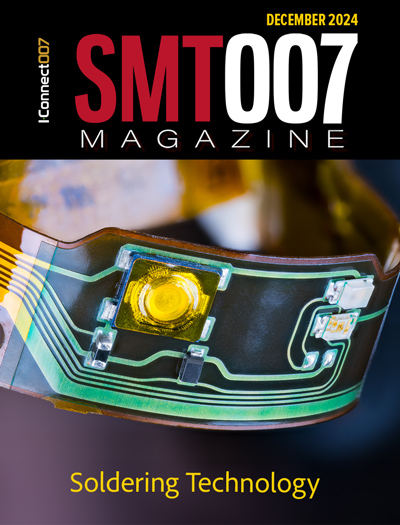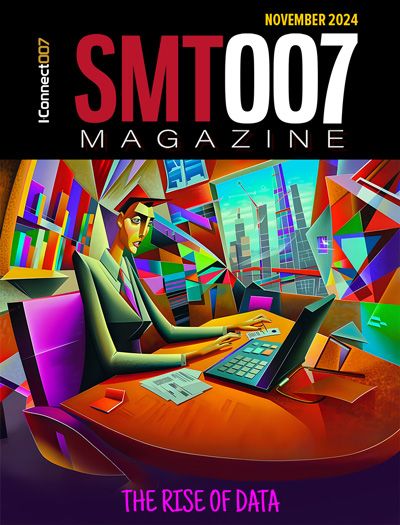-

- News
- Books
Featured Books
- smt007 Magazine
Latest Issues
Current Issue
The Path Ahead
What are you paying the most attention to as we enter 2025? Find out what we learned when we asked that question. Join us as we explore five main themes in the new year.

Soldering Technologies
Soldering is the heartbeat of assembly, and new developments are taking place to match the rest of the innovation in electronics. There are tried-and-true technologies for soldering. But new challenges in packaging, materials, and sustainability may be putting this key step in flux.

The Rise of Data
Analytics is a given in this industry, but the threshold is changing. If you think you're too small to invest in analytics, you may need to reconsider. So how do you do analytics better? What are the new tools, and how do you get started?
- Articles
- Columns
Search Console
- Links
- Media kit
||| MENU - smt007 Magazine
SEMI Energy Collaborative Releases Recommendations for Growing the Supply of Low Carbon Energy in Japan
September 3, 2024 | SEMIEstimated reading time: 2 minutes
Seeking to bolster global semiconductor value chain efforts to lower greenhouse gas (GHG) emissions, the industry association SEMI released today an analysis by its Energy Collaborative (EC) of current and forecasted low-carbon energy (LCE) markets for Japan, the second in a series of market-specific reports. Developed by the SEMI EC and its sponsors, incorporating insights from the Japanese government and partner organizations, the report outlines policy changes and investments required to increase LCE supply.
Japan is cited as one of the two most challenging markets for clean energy procurement in the latest annual disclosure report from RE100, a consortium of more than 400 companies committed to using 100% renewable energy. In 2022, LCE made up only 27% of Japan’s electricity generation mix with the remaining 73% covered by fossil fuels. The EC projects the total LCE demand in Japan in 2030 to be 390 to 450 TWh, with the best-case-scenario being that supply falls 20-80 TWh short of demand, providing for only 20%-50% of total voluntary corporate demand.
“The Japan government has goals to revitalize the semiconductor industry and triple global production from JPY 5 trillion now to JPY 15 trillion in 2030,” said Mousumi Bhat, PhD, Vice President, Global Sustainability Programs. “To do so, the industry will need access to LCE to meet its customers’ decarbonization expectations.”
The EC report recommends accelerating the installation of LCE in Japan by:
- Updating land usage policies that enable greater access for LCE development
- Alleviating current policy impediments to facilitate expanding and accelerating offshore wind development
- Overcoming transmission grid bottlenecks with greater clarity on long term grid development plan and implementation / project delivery
- Fostering community collaboration that accelerates designation of LCE promotion zones across the country
- Facilitating collaboration among industries to propagate knowledge of corporate LCE procurement mechanisms.
“The analysis and findings of this substantial body of research provides a strong basis for collaboration with the semiconductor industry, facilitated by the Energy Collaborative’s meetings with government, infrastructure, and other industry leaders,” said Bhat. We provide detailed scenarios of our industry’s needs, energy technology analysis, and the voice of a critical energy customer as the local government plans policies that impact future supply of LCE.”
Each recommendation is supported by detailed analysis of current and historical market conditions in Japan and draws from concrete examples of how other regions have successfully implemented similar measures to drive LCE adoption.
The Energy Collaborative report Key Challenges and Potential Solutions for Expansion and Procurement of Low-Carbon Electricity on Japan is the second of five, joining the report on South Korea. The EC will also analyze Taiwan, Malaysia and Singapore. Organizations sponsoring the EC will get access to more detailed analysis of each region.
Suggested Items
SEMI Energy Collaborative Releases Recommendations for Expanding Low Carbon Energy in Taiwan
10/16/2024 | SEMISEMI, the global industry association representing the semiconductor and electronics design and manufacturing supply chain, released a report by its Energy Collaborative (EC) with recommendations on expanding low-carbon energy (LCE) availability in Taiwan.
SEMI Energy Collaborative Releases Analysis and Recommendations for Increasing Supply of Low Carbon Energy in South Korea
08/12/2024 | SEMIIn an effort to help the global semiconductor value chain lower greenhouse gas (GHG) emissions, the industry association SEMI released today its first region-specific analysis of current and forecasted low-carbon energy (LCE) markets for South Korea.
SEMI, Energy Collaborative Sponsors Meet with South Korea MOTIE Officials to Present Recommendations on Expanding Renewable Energy
06/04/2024 | SEMISEMI, the industry association serving the global electronics design and manufacturing supply chain, as part of its Energy Collaborative (EC) Initiative, and EC Sponsors met with South Korea’s Ministry of Trade, Industry and Energy to discuss the EC analysis, recommendations and solutions to expanding access of the region’s semiconductor ecosystem to renewable energy – a critical factor for the South Korea chip supply chain to meet its net zero goals.
Symposium on Counterfeit Parts & Materials Program Finalized
05/08/2024 | SMTAThe SMTA is pleased to announce the technical program for the Counterfeit Parts & Materials Symposium. Co-organized by SMTA and the Center for Advanced Life Cycle Engineering (CALCE), the event will be held June 25-27, 2024 in Hyattsville, Maryland at the College Park Marriott Conference Center.
Symposium on Counterfeit Parts and Materials Program Finalized
06/16/2021 | SMTAThe SMTA and the Center for Advanced Life Cycle Engineering (CALCE) have announced the 2021 technical program for the annual Symposium on Counterfeit Parts and Materials is finalized.


